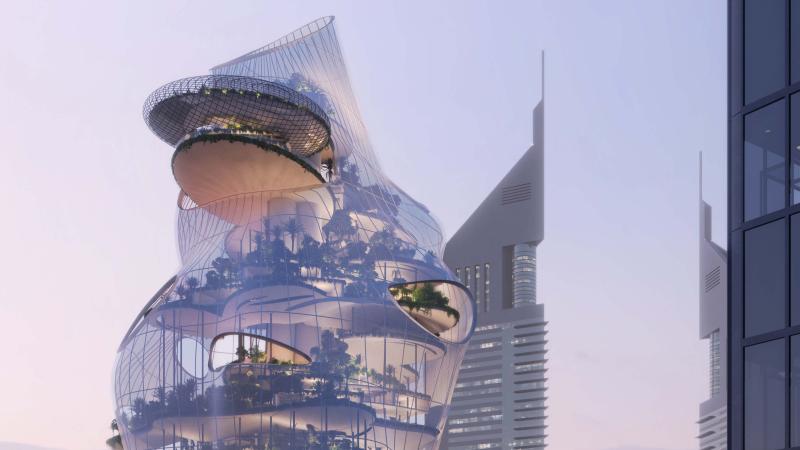Architecture students contribute to winning proposal for Radical Innovation competition
November 3, 2022

Students in Rensselaer Polytechnic Institute’s Bachelor of Arts in Architecture program contributed to the winning proposal in the recent Radical Innovation Awards competition, which challenges creative thinkers and designers at the professional and student level to pioneer compelling innovations in travel, hospitality, and architecture. The winning design, Aera, is a conceptual resort proposal from OBMI, a leading hospitality design firm and a consortium member in Rensselaer’s Institute for Energy, the Built Environment, and Smart Systems (EBESS), based in New York City.
Students in the spring 2022 Research Investigations class — Sarah Weber ’24, Aida Ayuk ’23, and Nicole Martinez ’23 — were based at Rensselaer’s Center for Architecture Science and Ecology (CASE) in Brooklyn. At CASE, students work together with faculty and industry professionals to invent new building system strategies applied to real-world built projects.
According to Josh Draper, lecturer at CASE, “the work that the BArch’s did last semester in my class was important to convince the jury of the project’s viability and depth.”
Aera is designed as a vertical resort. To develop a new model for urban tourism, the designers reimagined the horizontal guest journey found in traditional resorts to create a vertical destination in the middle of a city. Leveraging vertical architecture minimizes the footprint in areas where land is precious in value and availability, reducing the environmental impact. Aera’s design includes seven districts connected by walking trails, and a sky deck that includes a pool with a view of the city. The walking trails lined with greenery allow for a sense of escape from the stresses and challenges of the metropolis.
Tim Peck, chairman of OBMI, gave credit to the students at CASE for their assistance with the vertical resort concept. The project incorporates sustainable operating systems for the resort based on phytoremediation, which means using plants to condition air, water, and soil in an environment.
“They calculated respiratory CO2 emissions from the average human, as well as how much plant material it would take to absorb the CO2 from the 3,340 occupants at Aera and recycle it into 100% fresh air supply,” he said.
“To truly evaluate this concept we needed to establish a baseline and make this concept quantifiable at scale with existing plant species – to become a truly impactful sustainability solution for hospitality design,” Peck continued. “So that’s exactly what the folks at CASE did, using Aera as a model.”
This semester, CASE students Kit Hutton ’23 and Nora Wright ’24 will take the work further to develop tools and a workflow to integrate phytoremediation simulation into the architectural design process.
“Radical Innovation’s recognition of the Aera project exemplifies the possibilities of strong academic–industry collaboration” said Dennis Shelden, director of CASE and co-director of EBESS. “We’re thrilled to see this level of opportunity being made possible to RPI students through the innovative research and education programs being developed at CASE and across RPI.”